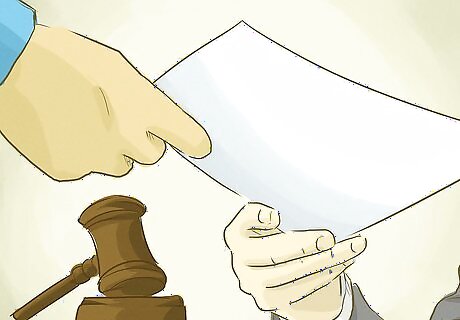
views
Proving the Existence of a Contract

Determine if there was an offer. All contracts, in order to be valid, must have four specific elements present. The first element of a valid contract is a valid offer. An offer is present if you or the other party make a promise to do (or refrain from doing) something in the future. To determine if an offer was present, think back to before the agreement was made between you and the other party. Try to find the moment where one of the parties made a promise to do something (or not do something). If you can find this moment, you probably have a valid offer. For example, a valid offer would exist if you promised a homeowner that you would paint their house. In the context of an oral contract, your offer might look something like this: "Hello, my name is Sam and I paint homes for a living. I will paint your home for $300."

Examine the presence of consideration. The second element of a valid contract is consideration, which is the thing of value that entices both parties to enter into the contract. Consideration often takes the form of money, services, or goods. The existence of consideration is what makes an enforceable contract different from a gift. For example, if you offer to paint someone's home for free, and you do not require the homeowner to do anything in return, you are making a gift. However, when you offer to paint someone's home and ask for $300 from the homeowner in return, you no longer are making a gift. Instead, you have a possible contract because consideration exists. In this example, the $300 the homeowner promises to pay you for the painting service is the consideration.

Ensure there was acceptance. An offer must be accepted unambiguously in order to create an enforceable contract. Acceptance can take many forms and you do not have to hear the words "I accept" in order to meet the requirement. Instead, acceptance can be conveyed through actions, performance, or words. When a valid offer, with consideration, is accepted, it is usually determined that mutuality is present. Mutuality is a requirement for a valid contract and ensures that both parties have a meeting of the minds (i.e., the parties understand what is being agreed to). However, if the acceptance does not mirror the terms of the offer, you have a rejection and a counteroffer. For example, if you offer to paint someone's house for $300, the homeowner could accept by saying, "Sounds good, I will have the money ready for you when you come to start the job tomorrow." The homeowner could also accept your offer by handing you $300. If you are a homeowner who asks your neighbor if they will paint your home for $300, your neighbor might accept your offer by starting to paint. However, assume you ask your neighbor if they want their house painted for $300. If your neighbor tells you they will only pay you $250, you do not have acceptance. Instead you have a rejection of the $300 offer and a counteroffer for $250. You will then have to do something (e.g., say "I accept" or start painting) in order to accept the counteroffer.

Make sure the other party does not have any defenses to the existence of the contract. In some circumstances, even if the other three elements of a valid contract exist (offer, acceptance, and consideration), the other party might have some defense to existence. Before you enter into an oral contract, make sure none of the following circumstances exist: The subject matter of the contract is illegal (e.g., the contract asks someone to murder someone else) The contract lacks consideration (e.g., You promise to pay Sam $20, but Sam is not required to do anything in return) One or more parties to the contract do not have legal capacity (e.g., You offer to paint Sam's tricycle for $20 and Sam agrees, but Sam is only seven years old)
Overcoming the Statute of Frauds

Understand the statute's purpose. While oral contracts are generally enforceable the same as any written contract, this rule does have its limits. Every state has a law called the "statute of frauds", which is a law intended to prevent fraudulent conduct in certain circumstances. In situations where the statute of frauds applies, an oral contract will not be enforced unless an exception to the statute of frauds is present. If you think you have a valid oral contract and you need to enforce it, go online and search for your state's statute of frauds. If you do not have consistent access to the internet, visit your local law library. Getting a copy of your state's statute of frauds will help you determine if and how it applies to your particular case.

Examine the types of contracts that must have some writing. The statute of frauds applies to contracts dealing with certain subject matters. If the statute of frauds applies, your contract must have some writing associated with it in order to prove the contract's existence. If the statute of frauds applies to your case, but your contract does not have any writing (i.e., your contract is completely oral, with no paper trail), the contract may be voidable in court. Generally speaking, most state statutes of frauds will apply to the following types of contracts: Contracts involving the sale or transfer of real property Contracts about debt Contracts that are impossible to perform within one year Some contracts for the sale of goods

Determine if your contract could fall into an exception to the rule. If you look at your state's laws and determine that your oral agreement falls within the statute of frauds, you may still be able to enforce it even if you do not have the required writing. Courts have created exceptions to the statute of frauds to avoid unfair results. If your oral agreement and the circumstances surrounding it fall into one of the following categories, you may still be able to enforce it: If one party has partially performed under the oral agreement, the non-performing party will not be allowed to void the contract in order to avoid keeping up their end of the bargain. If significant unfairness would result if the contract was voided. In this scenario, the party asking that the contract be voided will not be able to void the agreement if they should have known that the unfairness would arise. If both parties agree that the oral contract exists, then both parties will be bound by it.

Make sure you can overcome the burden of providing the evidence. When the statute of frauds becomes a roadblock to enforcement, you will usually have the burden of proving first that the statute of frauds does not apply, or second, that an exception to the rule applies. You will then have to collect enough evidence to show the other party, and possibly a court, that the statute of frauds cannot be used to void the oral contract. The statute of frauds will typically become an issue only after you try to enforce the contract. After some enforcement action is taken, the other party will typically use the statute of frauds as a defense to enforcement. For example, you might sue the other party for breach of contract and, in return, the defendant might claim the statute of frauds as a defense and attempt to void the agreement.
Collecting Evidence

Understand the facts of your case. Enforcing oral contracts can be uniquely difficult due to the lack of physical evidence that can be used to prove their existence. For this reason, knowing the context surrounding your case will be incredibly important when it comes time to enforce your contract informally (e.g., through discussions, mediation, arbitration) or formally (e.g., through a lawsuit). The facts of your case will end up creating the agreement and its terms. Therefore, before you take any enforcement action, write out a detailed narrative explaining the agreement and the circumstances surrounding it.

Find witnesses to the agreement. One of the best ways to demonstrate the existence of your oral contract is through witnesses that can corroborate your story. If, when you made the agreement, people were around you watching, listening, or even taking part in the deal, ask them for help. Tell them you are trying to enforce the agreement and ask them to write down a narrative of what they saw, heard, and thought. For example, if you agreed with your neighbor to paint their house for $300, maybe your spouse or parents were around when you made the offer and agreed to do the work. Also, maybe the neighbor had people over when you made the offer. Ask anyone that could have seen or heard your discussion and ask them to help.

Find as much writing as possible. Even if you do not have the agreement memorialized in writing, you might have written documents and correspondence that can help prove the existence and performance of the contract. All of these documents, put together, will help tell your story. For example, maybe you have a set of text messages with your neighbor where you check to see what time works best to do the painting. Maybe your neighbor responded and gave you a date to start working. It could be that you and your neighbor were sending emails back and forth about the type of paint you were going to use. You might possibly have saved voicemails where your neighbor is asking where they can send the money.

Consider whether the contract has been partly performed. One of the best pieces of evidence will be proof of performance by you or the other party. This type of evidence will help you and any enforcement body determine exactly what the terms of your agreement were, if one existed. For example, if your neighbor has already given you the $300, you can use this as evidence that an agreement was made. In another example, if you have already bought paint for the job, you can use those receipts to help make your case. Also, if you have started painting the house, take pictures of your work and progress.
Enforcing the Contract

Talk to the other party. A contract needs to be enforced when the other party fails to hold up their end of the bargain. Depending on the type of contract you are dealing with, this might take many forms. For example, you might need to enforce a contract if the other party is not paying you, if the work is not being completed as required, or if shipments aren't being sent with the correct goods or at the correct times. When an enforcement dispute first arises, reach out to the other party and try to work out the problem. Most of the time, the other party will be unaware of the problem or will be trying to fix it. Parties do not want to go to court or take part in formal proceedings in order to enforce a contract. Therefore, having an honest and straightforward conversation with the other party can often solve the dispute.

Negotiate a settlement. If informal conversations do not help you and the other party move toward a resolution, ask the other party to take part in some form of alternative dispute resolution (ADR). ADR is a great way to avoid court while asking professionals for help in enforcing your contract. Start by asking the other party to take part in mediation. During mediation, a neutral third party will sit down with both of you and discuss unique ways to resolve the dispute and hopefully enforce the contract. The mediator will not take sides and will not inject their own opinions. If mediation does not work, try non-binding arbitration. During arbitration, a judge-like third party will listen to both parties present evidence. After evidence has been presented, the arbitrator will take a side and inject their opinions into the case. The arbitrator will craft a written opinion stating who has the stronger case and how the case should be settled.

File a lawsuit for breach of contract. If everything else fails, you can bring an enforcement action against the other party. Before filing a lawsuit, make sure you find a good attorney to help you through your case. Apart from helping you gather evidence, draft documents for court, and argue your case if it goes to trial, your lawyer will make sure you file your case on time. This is incredibly important when it comes to oral contracts because they have a shorter statute of limitations than other contracts. When you want to file your lawsuit, you and your lawyer will draft a complaint for breach of contract and submit it to your local state court branch. To successfully argue that an oral contract has been breached (and that it should therefore be enforced), you will have to prove to the court that a contract existed, that it was breached, and that there are damages.

Take part in pretrial actions. Once your lawsuit is filed, you and your lawyer will take part in various pretrial actions including discovery, the filing of motions, and pretrial hearings. When you participate in discovery, you and the other party will exchange information about the case in order to get ready for trial. Once discovery is complete, the other party will most likely try to end the litigation by filing a motion for summary judgment. You can defeat a motion for summary judgment by showing the court there are genuine factual disputes surrounding your case. Right before trial starts, you and the other party will meet with the judge to discuss what the trial will look like. During this hearing, the judge will set a schedule for the trial and determine how it will proceed. Make sure you bring up every issue you want to bring up at trial. If you fail to do so, the judge might leave it off the schedule and you may not get to argue it at all.

Go to court. When trial starts, you and the other party will have an opportunity to present evidence to the court. When you present evidence, you and your lawyer will tell a story of how the contract was formed, what its terms were, and how it was being performed. The evidence you gathered earlier will play a big part in whether you convince the judge an oral contract exists. The other party will try to come up with an excuse for not performing and/or will try to argue no valid contract exists. At the end of trial, the judge will decide who was more convincing. If you win, the contract will be upheld and you will be awarded damages. If you lose, you will have an opportunity to appeal the decision to a higher court.




















Comments
0 comment